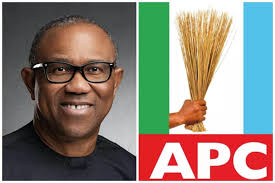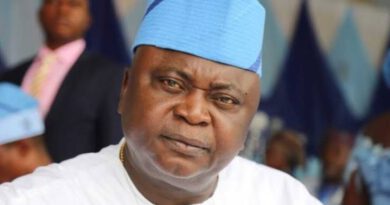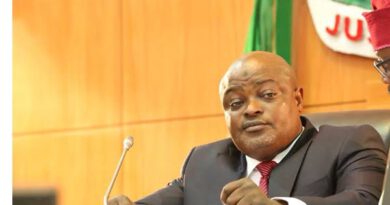Fouad Oki Raises Alarm Over Voter Apathy in Lagos LG Polls, Warns of 2027 Dangers
A chieftain of the All Progressives Congress (APC), Fouad Alade Oki, has raised serious concerns over the alarmingly low voter turnout recorded during the July 12, 2025 Lagos State Local Government elections, warning that the development poses a grave threat to the party’s chances in the 2027 general elections.
In a detailed preliminary report addressed to the leadership of the Lagos APC, Oki described the turnout as “catastrophic,” revealing that internal party figures and field intelligence indicate that no more than 6% of the over 6.8 million Permanent Voter Card (PVC) holders participated in the polls. This figure marks a sharp decline from the 11% turnout recorded in the 2021 local government elections and falls far below national averages for general elections.
Although the APC clinched all 20 chairmanship seats and 375 out of 376 councillorship positions, Oki stressed that the results merely paper over a deepening crisis within the party’s ranks. He described the victory as “hollow,” arguing that it was not backed by a legitimate democratic mandate but instead reflected widespread voter apathy, disenchantment, and a troubling disconnect between the ruling party and the electorate.
“The people didn’t vote against us—they simply didn’t vote at all,” he said. “This is a silent vote of no confidence not just in the APC but in the political establishment as a whole.”
Neglected Demographics, Internal Failings
Oki’s report also pointed to critical failings in the party’s outreach efforts, particularly among key demographic blocs such as the Arewa and Igbo communities in Lagos, as well as the youth and economically vulnerable populations.
According to him, the Arewa community—concentrated in areas like Agege, Mushin, Ojo, and Kosofe—has long been a reliable support base for the APC due in large part to the influence of former President Muhammadu Buhari. However, following Buhari’s death, the party has failed to maintain meaningful engagement with this bloc, resulting in feelings of neglect and marginalization.
Similarly, the Igbo community, despite repeated overtures, reportedly remains deeply skeptical of the APC. Oki attributed this mistrust to historical grievances, perceived political exclusion, and a lack of empathetic, culturally nuanced outreach.
The report was especially critical of the APC’s internal party structures, which Oki described as “ineffective, outmoded, and largely disconnected from today’s political realities.” He cited poor communication, weak mobilization, resource mismanagement, and the imposition of candidates as some of the key factors contributing to disillusionment at the grassroots level.
“Our Ward and LGA leadership structures are broken. The youth are shut out, loyal party workers are overlooked, and there is an overwhelming perception that the system is rigged from within,” he stated.
2027: A Looming Crisis
With voter trust eroding and party structures under strain, Oki warned that the APC risks losing Lagos as a stronghold if immediate and sweeping reforms are not implemented.
He warned of the potential emergence of a united and charismatic opposition force that could galvanize disaffected voters—particularly the youth—if the party fails to address the root causes of political apathy and disenfranchisement.
Among the consequences he listed were:
• Diminished moral authority to govern
• A shrinking and unreliable voter base
• Heightened internal party strife and possible defections
• Loss of Lagos’ strategic advantage in national politics
A Call for Urgent Review, Not Voter Registration
Oki criticized the party’s proposal to commence another mass voter registration drive in August, describing it as “a profoundly misguided impression.” He argued that rather than seeking to register new voters, the party must first investigate why those who are already registered chose to stay away from the polls.
To this end, he recommended an urgent intra-party conference exclusively for APC insiders with election management experience. This conference, he said, should undertake a rigorous post-mortem of the July 12 elections—assessing candidate selection, campaign effectiveness, logistics, and voter engagement failures.
Only after such a review, he said, should the party consider launching new voter registration efforts—this time embedded within a broader strategy of party reform, inclusivity, and trust-building.
Key Recommendations
Oki’s report concluded with a call for a comprehensive overhaul of the APC’s internal leadership structures, including:
• Empowerment of youth through meaningful leadership roles at the ward and LGA levels
• Inclusion of underrepresented groups such as the Arewa and Igbo communities
• Capacity building and training for grassroots party officials
• Restoration of internal democracy through credible, transparent primaries and elections
• Performance-based evaluation of party officials
“The July 12 elections are a red flag. If we ignore it, we do so at our peril,” Oki warned. “The future of the APC in Lagos and nationally depends on what we do next. The time for self-congratulations is over. The time for honest reflection and bold reforms is now.”
The report has since sparked internal debates within the party, with many grassroots members reportedly supporting the call for reforms ahead of the 2027 general elections.




